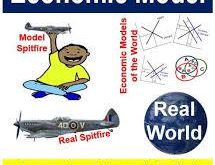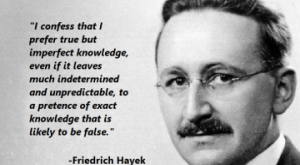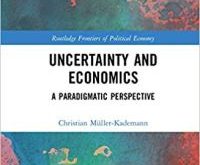Models and evidence in economics Analogue-economy models may picture Galilean thought experiments or they may describe credible worlds. In either case we have a problem in taking lessons from the model to the world. The problem is the venerable one of unrealistic assumptions, exacerbated in economics by the fact that the paucity of economic principles with serious empirical content makes it difficult to do without detailed structural assumptions. But the...
Read More »The pretence-of-knowledge syndrome
The reaction of human beings to the truly unknown is fundamentally different from the way they deal with the risks associated with a known situation and environment … In realistic, real-time settings, both economic agents and researchers have a very limited understanding of the mechanisms at work … In trying to add a degree of complexity to the current core models, by bringing in aspects of the periphery, we are simultaneously making the rationality assumptions behind that...
Read More »Uncertainty in economics
Not accounting for uncertainty may result in severe confusion about what we do indeed understand about the economy. In the financial crisis of 2007/2008 the demon has lashed out at this ignorance and challenged the credibility of the whole economic community by laying bare economists’ incapability to prevent the crisis … Economics itself cannot be regarded a purely analytical science. It has the amazing and exciting property of shaping the object of its own analysis. This...
Read More »Productivity, Labor Complexity, and Wage Determination Procedures
This post concerns an implication of Marx’s treatment of productivity and labor complexity for the appropriateness of alternative processes of wage determination. For simplicity, it is assumed that all activity is productive in Marx’s sense (that is, productive of surplus value) and that conditions are competitive in the Marxian (and classical) sense that investment is free to flow in and out of sectors in search of the highest return. Introducing unproductive labor, including a...
Read More »Modell och verklighet i nationalekonomi
Modell och verklighet i nationalekonomi Nationalekonomi är mer än någon annan samhällsvetenskap modellorienterad. Det finns många skäl till detta — ämnets historia, ideal hämtade från naturvetenskapen, universalitetsanpråk, viljan att förklara så mycket som möjligt med så lite som möjligt, rigör, precision med mera. Tillvägagångssättet är i grunden analytiskt — helheten bryts ned i sina beståndsdelar så att det blir möjligt att förklara (reducera)...
Read More »A Stock Market Boom is Not the Basis of Shared Prosperity
The US is currently enjoying another stock market boom which, if history is any guide, also stands to end in a bust. In the meantime, the boom is having a politically toxic effect by lending support to Donald Trump and obscuring the case for reversing the neoliberal economic paradigm. For four decades the US economy […]
Read More »The intellectual regress of macroeconomics
The intellectual regress of macroeconomics Real business cycle theory — RBC — is one of the theories that has put macroeconomics on a path of intellectual regress for three decades now. And although there are many kinds of useless ‘post-real’ economics held in high regard within mainstream economics establishment today, few — if any — are less deserved than real business cycle theory. The future is not reducible to a known set of prospects. It is not like...
Read More »Alternatives to mainstream economics
Alternatives to mainstream economics [embedded content]
Read More »Quinn Slobodian and the birth of neoliberalism
Quinn Slobodian and the birth of neoliberalism [embedded content] It is a measure of the success of this fascinating, innovative history that it forces the question: after Slobodian’s reinterpretation, where does the critique of neoliberalism stand? First and foremost, Slobodian has underlined the profound conservatism of the first generation of neoliberals and their fundamental hostility to democracy. What he has exposed, furthermore, is their deep...
Read More »On the impossibility of efficient markets
On the impossibility of efficient markets In general the price system does not reveal all the information about “the true value” of the risky asset … The only way informed traders can earn a return on their activity of information gathering, is if they can use their information to take positions in the market which are “better” than the positions of uninformed traders. “Efficient Markets” theorists have claimed that “at any time prices fully reflect all...
Read More » Heterodox
Heterodox





